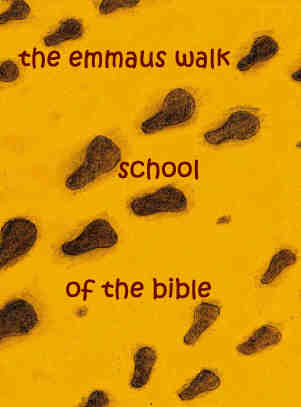
THE EMMAUS WALK PRESENTS:
"The Great Heathen Army,"
Part IV,
"Thought for the Day" Article on St. Patrick by Rev'd Herbert McGonigle, Permission to Reprint Being Sought*
With a Postscript by Ronald Ginther
Saint Patrick was undoubtedly the greatest evangelical Christian that Ireland has ever known. Tradition has it that he died on March 17th, 465 A.D., his grave marked by a large stone with the name "Padriac' hewn on it in the cathedral graveyard in Downpatrick, County Down. He was born about 385 A.D. in Bannaven, which some claim was near Dumbarton in Scotlant, some, the Welsh coast, others, close to the Bristol Channel.
His father, Calpornius, was a Roman magistrate and a deacon in the local church. His grandfather, Potitus, was a priest, so Patrick would have known of the Christian doctrines but they appeared to have little effect on him for he emerged as a godless leader of local gangs.
When only teenagers he, and two of his sisters, were kidnapped by Irish pirates and Patrick was sold as a slave to Milchu, the chieftain of North Dalaradia, a part of Ireland now known as County Antrim, and for whom he worked, feeding and herding pigs. Like the prodigal son featured in Luke Chapter 15, verses 11 to 12 in the Bible it was in these solitary surroundings that he came to his senses and later wrote, "I was sixteen years old and knew not the true God, but in that strange land the Lord opened my unbelieving eyes and, altho late, I called my sins to mind and was converted with my whole heart to the Lord my God, who regarded my low estate, had pity on my youth and ignorance, and consoled me as a father consoles his children."
Patrick escaped, persuaded a ship's captain to take him aboard, eventually arriving in France, contacted other Christians and became a deacon in the church before returning to Bannaven with a longing in his heart to spread the Christian faith in Ireland. He returned there in 432 and evangelized throughout the whole country for the next thirty years and founded over 400 churches, each with its own bishop or elder.
There you have an outline of his life, stripped of all myths, legends and superstitions that surround his name today. In his writings, Patrick records no miracles, except the miracle of lives changed by the power of Christ's gospel. It is a joy to share in praising God for this great evangelical Christian by whose fervent preaching of Bible truths thousands of Irish people came to know Jesus Christ as their Lord and Savior."

Postscript
The Gospel of the Savior Jesus Christ that Patrick carried to Ireland and planted there, did not remain there and eventually wither and die in the formalized religion of Roman Catholicism and the godless post-modern philosophy of secular humanism. No, like a vine it spread vigorously, sending shoots forth from various island monasteries to many points in Britain.
Starting not long after Patrick's death, St. Columba and other Irish monks turned missionaries carried the Gospel and the Church of Christ over the Irish Sea to heathen Anglo-Saxon England and also Scotland. That must have taken a considerable measure of courage and fortitude and perserverance! This re-evangelization of Britain must be one of the greatest positive ironies and turn-arounds in history! Christian countries across North Africa and the Middle East conquered by Islam back in the 8th century remain in the iron grip of Islam to this hour--yet Britain did not remain in the darkness of paganism after it was conquered in the 5th century. God had a much better destiny for England, considering the great future role she would play in spreading the Gospel to the world. In this plan Patrick played a most vital part, and Ireland with him, though he was British, not Irish, though he is today Ireland's patron saint so-called and countless parades and celebrations to his name are held throughout Ireland, Britain, America and elsewhere in the world. These celebrations are not anything he would have approved, for he was always a holy man who carried the Cross daily in his life and actions and lived in a way worthy of the Gospel and the Lord he served. The drinking, carousing, and spectacles that characterize St. Patrick's Day as a holiday in the U.S. and in Ireland and Britain, have nothing really to do with this devout Christian evangelist and His message to Ireland and the Irish people. We are thankful to Rev. McGonigle for his comments on Patrick, giving us a true, unvarnished and yet inspiring account of him without the tangle of myths and superstitions that have been heaped on his memory. Thank God for Patrick! Without him, could we say we would know Christ today in America and many other countries as wel? Could the Gospel have reached us without Patrick's obedience to the call of God on his life to go to Ireland with the message of Salvation in Christ? We do know for sure that Christian England spread the Gospel that was first re-introduced to her by Irish missionaries following the example, life, and preaching of Patrick.--Ronald Ginther
*Rev'd McGonigle's fine little article was forwarded to me by my English friend and magazine publisher. This is a "Thought on Saint Patrick," and in Liverpool and London and Ireland people can call his telephone numbers and access this and other "thoughts for the day" by Rev'd McGonigle. Since they are offered so freely to the public, we feel it is in the interest of the public here to receive a taste of what he can share with fellow Christians.
IN SUCCEEDING PARTS, WE SEEK TO GO ON TO THE HEATHEN VIKING INVASIONS OF ENGLAND IN THE 9TH-10TH-11TH CENTURIES, WHICH ALMOST BUT NOT QUITE ANNIHILATED CHRISTIAN ANGLO-SAXON ENGLAND. THE VIKING INVASIONS AND THE MIRACULOUS DELIVERANCE OF THE CHRISTIAN ANGLO-SAXONS WAS IN GOD'S PLAN, TO PRESERVE THE CHRISTIAN FAITH IN ENGLAND, WHICH BECAME A BASE AND SENDING PLATFORM FOR TENS OF THOUSANDS OF MISSIONARIES CARRYING THE GOSPEL OF JESUS CHRIST TO THE WHOLE WORLD (IN OTHER WORDS, THE DEVIL LOST HIS ATTEMPT TO DESTROY CHRISTIAN BRITAIN AND ENGLAND ONCE AGAIN!). PLEASE LOOK FOR THESE PORTIONS AS THEY COME ON-LINE.

For a fictionalized, but still true account of Patrick and his unique contribution to Ireland and, by propagation on his Gospel and work in Ireland, back to Britain, please go to:
"Chronicle of Patrick, Eire's Messiah," by Ronald Ginther

 The Emmaus Walk Home Page
The Emmaus Walk Home Page
 Butterfly Productions Home Page
Butterfly Productions Home Page
Format and Postscript Only: (c) 2008, Butterfly Productions, All Rights Reserved
